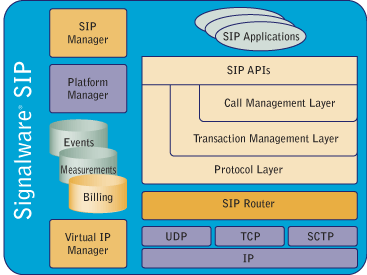SIP
2008-02-22 12:37:57来源:互联网 阅读 ()

Carrier-grade Signalware® SIP provides a complete development and deployment environment for customer-developed applications based on the SIP signaling protocols. This includes the combination of flexible SIP protocol access and platform management features that simplify the development process. Signalware SIP is a robust solution that is built on the same proven fault-resilient platform as Signalware SS7 and SIGTRAN.
Signalware SIP's high availability and scalability distinguish it from other SIP offerings. Features such as multiple computer element clusters and application failover and restart ensure revenue will not be lost due to downtime. Signalware SIP APIs can be added along side of SS7 or SIGTRAN signaling nodes to take advantage of Signalware's proven operational environment. Signalware SIP can also be deployed in a standalone environment, reducing product life cycle costs since one signaling platform supports multiple customer products.
The SIP architecture is modular and provides a simple, easy to use development environment for handling SIP session control. Signalware SIP allows developers to maintain state information at either the transaction level or at the call level. Because it is modularized, the underlying transport protocol (UDP, TCP, SCTP) is transparent from the user application. This transparency hides the communication details so developers can concentrate on the application.
Signalware applications can access the SIP protocol stack using any of the three abstraction levels as shown below: Protocol Function, Transaction Function, and Call Function. In addition, Signalware SIP includes important Routing and Management Functions that support the high availability features of the product.

Protocol Function
The Protocol Function provides low level encoding and decoding of SIP message formats. This is the lowest level that the developer can use to access SIP communications services. Signalware SIP is compliant with the latest IETF standards (RFC 3261, RFC 2327). The SIP library performs SIP parsing of standard requests (INVITE, ACK, BYE, CANCEL, REGISTER, OPTIONS) and responses. Optional SIP extensions (INFO, PRACK, SUBSCRIBE, NOTIFY, UPDATE, REFER, MESSAGE) support 3G wireless requirements for presence, availability and instant messaging services. The protocol function does not reject unrecognized extensions. Any unrecognized data is passed on as raw data to the application for further deciphering. This allows the developer to handle many proprietary extensions or special encoding defined by a SIP extension.
本新闻共2页,当前在第1页 1 2
标签:
版权申明:本站文章部分自网络,如有侵权,请联系:west999com@outlook.com
特别注意:本站所有转载文章言论不代表本站观点,本站所提供的摄影照片,插画,设计作品,如需使用,请与原作者联系,版权归原作者所有
- SIP能否成主流?IP电话协议比较 2008-02-22
- 几种开源SIP协议栈对比 2008-02-22
- SIP Technology Guide 2008-02-22
- H.323和SIP的比较 2008-02-22
- SIP协议全方位概要介绍 2008-02-22
IDC资讯: 主机资讯 注册资讯 托管资讯 vps资讯 网站建设
网站运营: 建站经验 策划盈利 搜索优化 网站推广 免费资源
网络编程: Asp.Net编程 Asp编程 Php编程 Xml编程 Access Mssql Mysql 其它
服务器技术: Web服务器 Ftp服务器 Mail服务器 Dns服务器 安全防护
软件技巧: 其它软件 Word Excel Powerpoint Ghost Vista QQ空间 QQ FlashGet 迅雷
网页制作: FrontPages Dreamweaver Javascript css photoshop fireworks Flash
